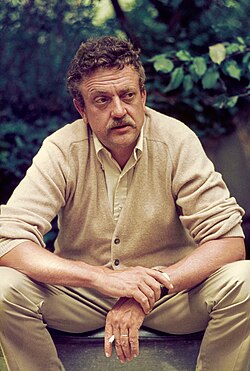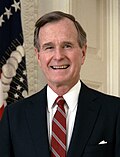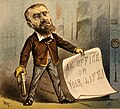Portal:United States
Introduction

| |

| |
Did you know (auto-generated) -

- ... that Ron Tiavaasue was born in Samoa, grew up in New Zealand, played college football in the United States, and now plays professional football in Canada?
- ... that retired United States Marine Corps three-star general Willie Williams originally planned to enlist in the Air Force after high school instead of going to college?
- ... that a candidate in the 1968 United States House of Representatives election in Delaware took his dog on the campaign trail?
- ... that the Occupational Safety and Health Administration, a United States regulatory agency, does not require workplaces to have employee break rooms?
- ... that the New Yorker Hotel once had the largest private power plant in the United States?
- ... that Philadelphia's Washington Monument was unveiled at its dedication in 1897 by the president of the United States?
- ... that anti-refugee activist Ann Corcoran has claimed that refugees are a Muslim plot to colonize the United States?
- ... that the 1944 SCR-720 radar system was used only briefly by the USAAF, but was a primary RAF system into the late 1950s?
Selected society biography -
Born into a wealthy, established family in Milton, Massachusetts, Bush was raised in Greenwich, Connecticut. He attended Phillips Academy and served as a pilot in the United States Navy Reserve during World War II before graduating from Yale and moving to West Texas, where he established oil company Zapata Corporation. Following an unsuccessful run for the United States Senate in 1964, he was elected to represent Texas's 7th congressional district in 1966. President Richard Nixon appointed Bush as the ambassador to the United Nations in 1971 and as chairman of the Republican National Committee in 1973. President Gerald Ford appointed him as the chief of the Liaison Office to the People's Republic of China in 1974 and as the director of Central Intelligence in 1976. Bush ran for president in 1980 but was defeated in the Republican presidential primaries by Reagan, who then selected Bush as his vice presidential running mate. In the 1988 presidential election, Bush defeated Democrat Michael Dukakis.
Foreign policy drove Bush's presidency as he navigated the final years of the Cold War and played a key role in the reunification of Germany. He presided over the invasion of Panama and the Gulf War, ending the Iraqi occupation of Kuwait in the latter conflict. Though the agreement was not ratified until after he left office, Bush negotiated and signed the North American Free Trade Agreement, which created a trade bloc consisting of the United States, Canada and Mexico. Domestically, Bush reneged on a 1988 campaign promise by enacting legislation to raise taxes to justify reducing the budget deficit. He championed and signed three pieces of bipartisan legislation in 1990, the Americans with Disabilities Act, the Immigration Act and the Clean Air Act Amendments. He also appointed David Souter and Clarence Thomas to the Supreme Court. Bush lost the 1992 presidential election to Democrat Bill Clinton following an economic recession, his turnaround on his tax promise, and the decreased emphasis of foreign policy in a post–Cold War political climate. (Full article...)
Selected image -
Selected culture biography -
Shortly after the publication of The Old Man and the Sea in 1952 Hemingway went on safari to Africa, where he was almost killed in a plane crash that left him in pain or ill-health for much of the rest of his life. Hemingway had permanent residences in Key West, Florida, and Cuba during the 1930s and '40s, but in 1959 he moved from Cuba to Ketchum, Idaho, where he committed suicide in the summer of 1961.
Selected location -
The route was constructed over a historic corridor, first used for the Pony Express and later for the Central Overland Route and Lincoln Highway. Before the formation of the U.S. Highway System, most of US 50 in Nevada was designated State Route 2. The routing east of Ely has changed significantly from the original plans. The route change resulted from a rivalry between Nevada and Utah over which transcontinental route was better to serve California bound traffic, the Lincoln Highway or the Victory Highway.
Selected quote -
Anniversaries for May 4
- 1626 – Dutch explorer Peter Minuit arrives in New Netherland (present day Manhattan Island) aboard the ship See Meeuw.
- 1776 – Rhode Island becomes the first American colony to renounce allegiance to King George III of the United Kingdom.
- 1865 – Abraham Lincoln buried in Springfield, Illinois, three weeks after his assassination.
- 1904 – Construction begins by the United States on the Panama Canal.
- 1961 – The "Freedom Riders" (member pictured) begin a bus trip through the South.
- 1970 – The Ohio National Guard are sent to Kent State University after the ROTC building was burnt down, and subsequently open fire on students protesting at the American invasion of Cambodia. Four students are killed and nine are wounded.
Selected cuisines, dishes and foods -

Soul food is the ethnic cuisine of African Americans. Originating in the American South from the cuisines of enslaved Africans transported from Africa through the Atlantic slave trade, soul food is closely associated with the cuisine of the Southern United States. The expression "soul food" originated in the mid-1960s when "soul" was a common word used to describe African-American culture. Soul food uses cooking techniques and ingredients from West African, Central African, Western European, and Indigenous cuisine of the Americas. (Full article...)
Selected panorama -
More did you know? -
- ... that the domed atrium of Indiana's West Baden Springs Hotel (inside pictured) was the largest free-spanning dome in the United States for over 50 years and in the world from 1902 to 1913?
- ... that Nicholas Longworth built America's first commercially successful winery with a pink sparkling wine made from Catawba?
- ... that the phrase "more bang for the buck" was used to describe the United States' New Look policy of depending on nuclear weapons, rather than a large regular army, to keep the Soviet Union in check?
Topics
Categories
Featured content
List articles
|
Culture Education Economy |
Geography Government
History |
Law Media Natural history |
People Protected areas Religion Transportation |
Tasks
Featured article candidatesTotal pages in content type is 5 Featured list candidatesTotal pages in content type is 5 Good article nominees
Total pages in content type is 109 | ||||
|
To create
To discuss on Articles for deletion
To expand To destub |
Assessment requests New articles Most Popular pages To find images |
Maintenance and cleanup
Other issues
| ||
Related portals
State-related
Region or city-related
Sports-related
Transportation-related
Other US-related
Nearby areas
WikiProjects
Associated Wikimedia
The following Wikimedia Foundation sister projects provide more on this subject:
-
Commons
Free media repository -
Wikibooks
Free textbooks and manuals -
Wikidata
Free knowledge base -
Wikinews
Free-content news -
Wikiquote
Collection of quotations -
Wikisource
Free-content library -
Wikiversity
Free learning tools -
Wikivoyage
Free travel guide -
Wiktionary
Dictionary and thesaurus
More portals
































































